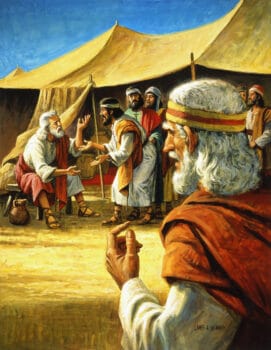Daily Lesson for Wednesday 13th of August 2025
Moses was visited by Jethro, his father-in-law, who is also called Reuel (Exodus 2:18). Jethro brought with him Moses’ wife, Zipporah, and two sons, Gershom and Eliezer. When Moses heard that they were coming, he went out to welcome them.
Read Exodus 18:1-27. What major steps in the history of the nation took place here?
Jethro came because he had heard about the astonishing deliverance God had done for Israel. Moses narrated to Jethro in detail “everything the Lord had done to Pharaoh and the Egyptians for Israel’s sake and about all the hardships they had met along the way and how the Lord had saved them” (Exodus 18:8, NIV).
Jethro praised God’s kindness and extraordinary interventions on behalf of His people, declaring,
“ ‘Blessed be the Lord, who has delivered you out of the hand of the Egyptians and out of the hand of Pharaoh and has delivered the people from under the hand of the Egyptians. Now I know that the Lord is greater than all gods, because in this affair they dealt arrogantly with the people’ ” (Exodus 18:10-11, ESV).
What we see here is an example of how God’s work among His people was to be a witness to the world of who the true God is and of what He can do for His people.
At the same time that Jethro learned about the true God, he himself had something to offer God’s people: wise and beneficial advice. Moses needed to organize the legal system with just and fair principles. He also needed dedicated and faithful judges, men of integrity. Jethro wisely enumerated the following qualifications: (1) men who fear God; (2) men who are trustworthy; and (3) men who hate dishonest gain. Capable people of good character had to be appointed over different units of thousands, hundreds, fifties, and tens. In this way, Moses’ administrative load would be reduced, and he could focus on significant problems. Thus, the people would be well served.
Moses accepted Jethro’s wise counsel (Exodus 18:24) and appointed leaders to different administrative roles (see also Deuteronomy 1:9-18).
|
Moses could have just brushed off the old man and told him to mind his own business. He didn’t. What important lessons can we learn from his willingness to listen to this person who wasn’t even a Hebrew? |
 (0)
(0)



